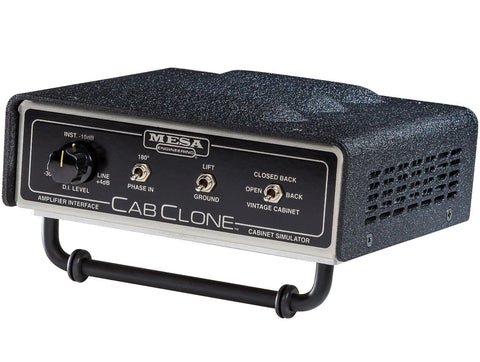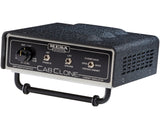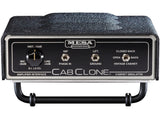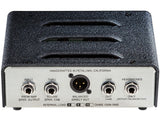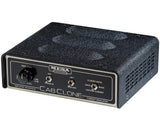Mesa Boogie CabClone Guitar Cab Simulator - 8 Ohm
- DESCRIPTION
The new Mesa Boogie Cabclone is a passive Cabinet Simulator with a built-in Amp Load for amps rated at 100-watts or less.
It provides a direct interface of your guitar amp's Speaker Output to the input of a mixing console, microphone preamp or even direct to your recording device, with or without the need for a speaker cabinet. It's also a Compensated Headphone Driver that delivers a great sounding, great feeling headphone-friendly version of your amp's tone that is perfect for late night practice sessions or anytime you want to play without disturbing others.
Think of all the applications a Cab Clone would come in handy:
Featuring an internal (resistive type) load that can also be defeated, the CabClone can be used to capture a direct signal either with or without a live speaker connected to the amplifier. When used with a Speaker (connected to the Rear Panel THRU jack) the dynamic content will be increased along with a slight increase in top end. Without a speaker connected the internal resistive load provides a very good representation of the amplifier's feel (considering it is a fixed impedance and does not change with frequency) and is rated for 100 Watts at 8 Ohms (Standard). The Cabclone is designed for amps rated at 100-Watts or less and the standard format is wired for a nominal impedance of 8 OHMs. Also available are 4 OHM and 16 OHM versions that allow proper impedance matching with other MESA's as well as non-MESA amplifiers. Using this internal load scenario, you can transform any amplifier into a powerful silent recording tool.
The Front Panel features an adjustable D.I. (Output) Level control that accommodates a wide range of destination input requirements ranging from Mic (-30dB) to Instrument/ Line (-10dB) to Pro LINE (+4dB) and anywhere in between. This adjustable pot allows you to fine tune the signal strength for virtually any kind of monitoring or recording environment.
A Phase Flip switch is provided as well to allow inverting of the phase 180 degrees when blending the Cabclone signal with other sources in recording or live environments.
The Front Panel Ground/Lift switch allows you to lift the Cabclone Balanced Direct Out XLR's Pin 1 (Ground), from the Circuit and Chassis Ground. In many cases this can remove annoying ground loops that can occur from grounded devices that have their own different ground reference when interfacing to consoles.
At the far right of the Front Panel there is a Voicing switch giving you three popular choices for the style of Speaker Cabinet simulated. The upper Closed Back position scoops the midrange and also allows more of the upper harmonic region through, simulating the response of a vintage-era British 4x12 cabinet loaded with 30 watt speakers. This response is often preferable for heavily saturated rhythm and/or lead work where you want a midrange scoop and a huge sonic spread (width). The center Open Back position takes the lid off a bit so the upper harmonics can shine through and provide a more open, three-dimensional sound with accentuated top end. This position works well for clean work and overdriven rhythm applications where a brighter, faster response is in order. The lower Vintage Cabinet position is the darkest, most compressed choice and offers the best response for single note soloing, especially when higher gain sounds are in use. This setting will keep lead work fat and round and free of buzzy gain artifacts.
Within these three selectable Voicing positions you'll find the ability to tune the Cabclone's response to work well for almost any sound style. Keep in mind that adding a live speaker to the THRU may affect the sound and the sound of these VOICING choices... possibly making things more reactive dynamically and perhaps brighter as well, depending on the speaker's inherent characteristics that you have chosen.
It provides a direct interface of your guitar amp's Speaker Output to the input of a mixing console, microphone preamp or even direct to your recording device, with or without the need for a speaker cabinet. It's also a Compensated Headphone Driver that delivers a great sounding, great feeling headphone-friendly version of your amp's tone that is perfect for late night practice sessions or anytime you want to play without disturbing others.
Think of all the applications a Cab Clone would come in handy:
- Late Night: Practicing using the headphone out
- Recording in a Studio (especially your Home studio where volume or acoustic properties may be an issue): Using the Direct Out and taking advantage of the Internal Amp Load feature (no cabinet required)
- Live Performance: In place of a microphone (one less microphone for signal to bleed into) using the Speaker Cab Out to still get the tone & feel on stage of your full rig
- Live Performance: In place of an IsoBox (ideal for the Church guitarist) - Your amp's line through the monitors or in ears - again, taking advantage of the Internal Amp Load feature (no cabinet required)
- Studio & Live Performance: In addition to a microphone, giving you the choice of the Cabclone Balanced Direct Out, the Mic or both for the ability to blend them (in real time or later) in a mix session
One quick note about the "Tilt-Back Stand" feature - It is easily removable by simply removing two screws and yes, the CabClone does have rubber feet.
More Details:Featuring an internal (resistive type) load that can also be defeated, the CabClone can be used to capture a direct signal either with or without a live speaker connected to the amplifier. When used with a Speaker (connected to the Rear Panel THRU jack) the dynamic content will be increased along with a slight increase in top end. Without a speaker connected the internal resistive load provides a very good representation of the amplifier's feel (considering it is a fixed impedance and does not change with frequency) and is rated for 100 Watts at 8 Ohms (Standard). The Cabclone is designed for amps rated at 100-Watts or less and the standard format is wired for a nominal impedance of 8 OHMs. Also available are 4 OHM and 16 OHM versions that allow proper impedance matching with other MESA's as well as non-MESA amplifiers. Using this internal load scenario, you can transform any amplifier into a powerful silent recording tool.
The Front Panel features an adjustable D.I. (Output) Level control that accommodates a wide range of destination input requirements ranging from Mic (-30dB) to Instrument/ Line (-10dB) to Pro LINE (+4dB) and anywhere in between. This adjustable pot allows you to fine tune the signal strength for virtually any kind of monitoring or recording environment.
A Phase Flip switch is provided as well to allow inverting of the phase 180 degrees when blending the Cabclone signal with other sources in recording or live environments.
The Front Panel Ground/Lift switch allows you to lift the Cabclone Balanced Direct Out XLR's Pin 1 (Ground), from the Circuit and Chassis Ground. In many cases this can remove annoying ground loops that can occur from grounded devices that have their own different ground reference when interfacing to consoles.
At the far right of the Front Panel there is a Voicing switch giving you three popular choices for the style of Speaker Cabinet simulated. The upper Closed Back position scoops the midrange and also allows more of the upper harmonic region through, simulating the response of a vintage-era British 4x12 cabinet loaded with 30 watt speakers. This response is often preferable for heavily saturated rhythm and/or lead work where you want a midrange scoop and a huge sonic spread (width). The center Open Back position takes the lid off a bit so the upper harmonics can shine through and provide a more open, three-dimensional sound with accentuated top end. This position works well for clean work and overdriven rhythm applications where a brighter, faster response is in order. The lower Vintage Cabinet position is the darkest, most compressed choice and offers the best response for single note soloing, especially when higher gain sounds are in use. This setting will keep lead work fat and round and free of buzzy gain artifacts.
Within these three selectable Voicing positions you'll find the ability to tune the Cabclone's response to work well for almost any sound style. Keep in mind that adding a live speaker to the THRU may affect the sound and the sound of these VOICING choices... possibly making things more reactive dynamically and perhaps brighter as well, depending on the speaker's inherent characteristics that you have chosen.





